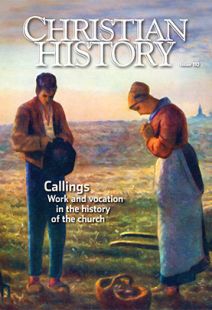Vocation, Did You Know?
Does my Christianity change the way I approach my work?
[Augustine meditated on whether he should remain a teacher of rhetoric after his conversion.] And under your oversight I decided that my tongue would no longer serve the chattering industry. . . . I did not want my mouth to be an arms merchant to the raging passions of boys who were not studying your law or your peace, but crazy lies and legal battles.
Fortunately only a few days were left before the grape-harvest holiday, and I decided to hold on for those few days, so that I could take formal leave. Since you had bought me back, I determined that I would never return to put myself up for sale again. (Confessions, Book IX, ch. 2)
Can I balance work and prayer?
The active life may be considered from two points of view. First, as regards the attention to and practice of external works . . . it is evident that the active life hinders the contemplative, insofar as it is impossible for one to be busy with external action, and at the same time give oneself to Divine contemplation. Secondly, active life may be considered as quieting and directing the internal passions of the soul; and from this point of view the active life is a help to the contemplative, since the latter is hindered by the inordinateness of the internal passions. . . .
Hence [Pope Gregory I] says. . . . “Those who wish to hold the fortress of contemplation must first of all train in the camp of action. Thus after careful study they will learn whether they no longer wrong their neighbor, whether they bear with equanimity the wrongs their neighbors do to them, whether their soul is neither overcome with joy in the presence of temporal goods, nor cast down with too great a sorrow when those goods are withdrawn.” (Thomas Aquinas, Summa Theologiae, question 182.a.2)
When should I stop talking and start working?
All men naturally desire to know; but what avails knowledge without the fear of God? Surely, a humble laborer that serves God is better than a proud philosopher who neglecting himself labors to understand the course of the heavens? . . .
O, if men bestowed as much labor in the rooting out of vices, and planting of virtues, as they do in moving of questions [arguing], neither would there so much hurt be done, nor so great scandal be given in the world, nor so much looseness be practiced in Religious Houses [convents and monasteries]. Truly, at the day of judgment we shall not be examined on what we have read, but what we have done, not how well we have spoken, but how religiously we have lived. Tell me now, where are all those Doctors and Masters, with whom you were well acquainted, while they lived and flourished in learning? (Thomas à Kempis, The Imitation of Christ, chapters 2, 3)
Can I persevere even when I don’t see God?
My Lord God, I have no idea where I am going. I do not see the road ahead of me. I cannot know for certain where it will end. Nor do I really know myself, and the fact that I think that I am following your will does not mean that I am actually doing so. But I believe that the desire to please you does in fact please you.
And I hope I have that desire in all that I am doing. I hope that I will never do anything apart from that desire. And I know that if I do this you will lead me by the right road though I may know nothing about it. Therefore will I trust you always though I may seem to be lost and in the shadow of death. I will not fear, for you are ever with me, and you will never leave me to face my perils alone. (Thomas Merton, Thoughts in Solitude)
Can I follow God’s will without knowing how i got there?
We were just sitting there talking when lines of people began to form, saying, “We need bread.” We could not say, “Go, be thou filled.” If there were six small loaves and a few fishes, we had to divide them. There was always bread.
We were just sitting there talking and people moved in on us. Let those who can take it, take it. Some moved out and that made room for more. And somehow the walls expanded.
We were just sitting there talking and someone said, “Let’s all go live on a farm.” It was as casual as all that, I often think. It just came about. It just happened. I found myself, a barren woman, the joyful mother of children. It is not always easy to be joyful, to keep in mind the duty of delight. (Dorothy Day, The Long Loneliness) CH
Dorothy Day quote courtesy of “The Final Word Is Love,” The Catholic Worker, May 1980, http://www.catholicworker.org/dorothyday/Reprint2.cfm?TextID=867.
By the Editors
[Christian History originally published this article in Christian History Issue #110 in 2014]
Next articles
Gifts that differ; callings that unite
An interview with the editor of the Theology of Work Project
Will MessengerCalled First to Christ
Early Christians preached that coming to Christ changed everything
Beth Felker JonesReading scripture, washing feet
Benedict’s monastic Rule addresses both physical and spiritual aspects of the monastic calling
Benedict of NursiaSupport us
Christian History Institute (CHI) is a non-profit Pennsylvania corporation founded in 1982. Your donations support the continuation of this ministry
Donate



